
Written by: The Administrator
The promo email for NODINE's Amateur Land was unexpected but far from unwelcome. The artist behind black metal outfit Ainor switched gears and now makes rap/trap/experimental hip hop under a new moniker, released via Syrup Moose Records? In the world of artistic development, that's an exciting switchup. My interest? Considerably piqued. While the genre tags may imply a shiny polish, this isn't clean stuff from a production standpoint--it feels like the rap equivalent of a classically homegrown bedroom black metal project. That, my friends, is by no means a bad thing. Amateur Land feels homegrown in the best sense, providing an eclectic spread that feels tangible and human and raw. There's some trap, some borderline rage-fueled horrorcore, some minimalistic boom bap, and requisite let-me-get-a-braggadocious-one-in-real-quick freestyles. Every track brings something new to the formula, giving the whole affair a very exploratory feel, almost like NODINE is attempting to map complex terrain via the light of glowstick. In a world where artists are all-too-oft trapped in a trademark aesthetic, I find significant value in a deliberately eclectic collection of sights and sounds. It can make for a jarring listening experience, but consider: being jarred is good. While seemingly random, the list of stuff I enjoy herein is extensive. I really like the electronic titular refrain on "Designer," as well as the general eerie synth and dusty antiquated air of "Gimme Love." This track in particular is causal and warm, and makes me feel like I am present for the recording. Perhaps even actively contributing to the backing vocals. Mixing is minimal, and the track feels significantly intimate as a result. There's a sense of narrative self-awareness permeating the album--the throat clears on "Around" are a particularly sick inclusion, and add a level of grounded realness to the more urgent flow. There's a plethora of humorous lines littered throughout, lending the whole project a sense of fun. Meanwhile, more dark trap/horrorcore oriented elements hit hard within the framework of an intrinsically raw backdrop--take ominous highlight "Clave" as a prime example, with its raging vocals bursting forth from the noise. I do wish that these darker aesthetics weren't so frontloaded on the album, as they are among some of my favorite moments. Some tracks are an obvious display for instrumentation--see the lengthy closer Poison"--but Amateur Land doesn't feel caught up in the production choices, nor does the eclectic beat selection attempt to fight for the limelight. This project features some rapping rapping, the kind of bars that feel like they needed to be expulsed in a single session. "Goosebumps," the arguably most polished track herein and the only with a feature, has a fun enthusiasm and a delightful interplay between fast raps and a fun singsong cadence. Featured rapper Veli5 has a casual off-the-cuff delivery that fits the track quite well. The verses on "Ridicule" and "Confession" are particularly well executed as well, and while the tracks clocks in at an exceptionally brisk 1:15 and 1:11 respectively, they feels like fleshed out statements. Stand-alone vignettes often exist as ideas rather than songs proper, and while down the road I could easily see these moments built into full tracks, they accomplish their mission well for an introductory tape. You aren't gonna find much typical song structure herein. Outside the scope of this release, I am excited in general by the prospect of Syrup Moose Records releasing more hip hop albums. I personally believe that there is great value in underground labels representing a wide range of genres, and in a similar vein, there is great value in introducing a primarily metalhead audience to something outside the ol' wheelhouse--namely, more rap. NODINE represents a fantastic step in that direction. While the sonic territory is obviously different, the intrinsic rawness, emotive air, and eclectic DIY ethos isn't exactly unfamiliar. Bottom line? I've really enjoyed my time with Amateur Land, and I've enjoyed digging into its assorted nooks and crannies. Regardless of whether or not you consider yourself a fan of raw and experimental hip hop, I recommend check this one out. NODINE - Amateur Land was released April 5th, 2024 via Syrup Moose Records. Find it here!
NODINE can be found:
Bandcamp
0 Comments
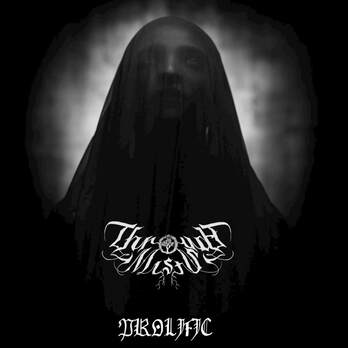
Written by: The Administrator
A quick stroll through the archives will indicate that we slumbering and ink-splattered scribes are no strangers to hosting a good ol' Through Mists premiere. Back in 2022 we dropped a couple if 'em back-to-back, writing about the both the overtly referential "Awaken The Sleeping Village" and the epic bird-centric concept album "Mindless Automations." Since then, Through Mists has proven prolific to an intimidating degree, releasing a frankly astounding six(!) albums in 2023. Of these, I was a particular fan of Starkiller, which embraced an aggressive yet proggy sonic palette and a distinctly mythical lyrical direction. Perhaps the best album from the project to date, in my opinion. Time moves on, and the Through Mists machine churns ever onward, albeit with a slightly longer timeframe separating the old and new material. And so here we are, with a new Through Mists release on the cusp of official droppage. The appropriately entitled Prolific--a four track EP--will be available tomorrow, April 25th. In the hours preceding, we are honored to host a premiere of the EP in full here in our less-than hallowed halls. Give it a listen below! As always, we'll meet ye on the other side to discuss. 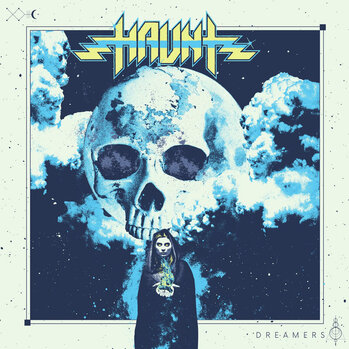
Written by: Blackie Skulless
Leave it to Trevor to take me out of review retirement, huh. Year after year, I have found myself writing (at least) a review for Haunt annually. Anybody who has followed me knows how much I love everything from Mind Freeze and before, and how much I love different things about each following record without my mind needing to be blown. Well, I guess Dreamers is the one to break that trend, because boy do things actually take a turn here! Not to say that Haunt has stepped away from the heavy metal genre, but this is the most significant deviation from their classic core that we’ve gotten thus far. Rather than being another cut of stripped-down traditional metal with mildly varying toppings, this lifts up different layers to take the forefront. Strangely, the vocals and guitars swap taking a backseat despite still being a vital ingredient, depending on the track. The drum clashes pop harder than ever, and the synths feel like a tool to cast a mistier atmosphere rather than being another outlet for melody like on former records. 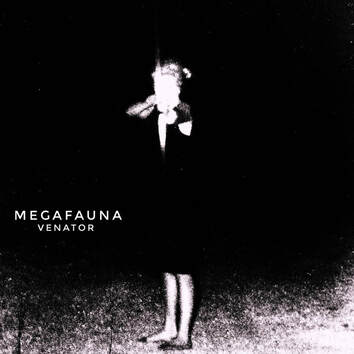
Written by: The Administrator
Those of you with an uncanny memory may recall that, towards the end of my recent review of Megafauna's eerie and excellent Venator, I made mention of a premiere. Here we are, folks. Venator will officially be released this Friday, April 19th, via Syrup Moose Records, but if you're unwilling to wait, we invite you to listen to it in full below. Of course, some preparation is called for If you're invested in full experience, I highly recommend hiking into the deepest darkest forest you can reasonably find. Walk until you find a dilapidated shack, or perhaps a large pile of bones that look suspiciously familiar. Set up camp. Wait for dark, and then wait for your flashlight battery to die. Make peace with the fact that there is almost certainly something in the woods, and i̵̲̾͑̏t̷̜̝̳̏ ̸̼͝i̴͉̥̲̗͋̊s̵̨̬̹͙͓͕̿̈̉̔̌͠ ̵̡̭̜̩͌̈́̽͛̌̚ͅͅw̶̧̹̮̯̌̈ą̴̹̼̮̼̖́̆̑͆̓͝t̵̨̨͇̺̂̇̇̅͆̋͜͠c̶̢̧̻̞̈́̓͝ḥ̶̢͐̉̄̓̓̋i̷̦͈̠̎̇̊͂̔͠n̵̼͛g̴̨̮͉̲̠͆. Check out Venator below, and, as always, we'll meet you on the other side. Much to the chagrin of pretty much everyone, I'm not done waxing poetic just yet. In a continuing attempt to cover more music that would all-too-oft slip through the very large cracks, we slumbering scribes are making an effort to publish short reviews at a greater frequency, thereby shining our very small spotlight on more cool shit. Here's a mini-review of the latest single from an artist that made my 2023 EP list.  Written by: The Administrator It is time, dear readers, for something completely different. che's excellent Crueger made the cut for my list of favorite 2023 EP's, largely due to a sense of overblown excess that smothered the minimalism of his breakout "euphoria." Indeed, to quote my review, Crueger proudly displayed the "maximalism of horrorcore and rage with the arguably more maximalist maximalism of Chicago drill." Given this apparent dedication to generally weird and ominous vibes, I've quite enjoyed che's sound, especially his most recent output. The two singles released this year thusfar are a little more bright, a little less obfuscated and claustrophobic, yet still notably weird. He dropped the one-off "bae" back in February, which I enjoyed, but "Miley Cyrus," released March 27th, is truly excellent in my humble opinion. The production on "Miley Cyrus," courtesy of Prettifun, is comparatively crisp and clean with moments of thickly grounded bass, giving the whole affair a certain oomph. The production is sure-assured, layered enough to feel full yet never overwhelming che's presence. It's also a small thing, but I really enjoy the track's conclusion as the components fall apart in a fun sonic de-evolution. As for che, his flow is trippy and hypnotic; he glides over the beat in a way that feels more effortlessly than past efforts. This is the epitome of smooth delivery. What the fuck is he saying? Individual words and phrases are apparent, but when you string it all together, I have no clue what meaning the lyrics impart. Does that matter? Not at all. The uncertainty of what it all means is only exemplified by the video, which features a series of seemingly random bits of footage--some mundane, some unsettling. The whole thing appears to have been edited by someone swiftly fluctuating between paranoid insomnia and hallucinatory threshold consciousness. It's groggy and delirious and oddly intoxicating. Much like the song itself, I can't see many Sleeping Village regulars vibing with the experience per se, but I wholeheartedly encourage checking out weird underground shit on mere principle. This isn't a bad place to dive in. Overexplaining seems antithetical to the music itself, so I'll shut up and let you check it out below. che - Miley Cyrus was released March 27th, 2024 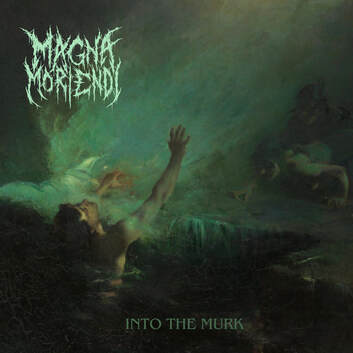
Written by: The Administrator
Horizon-gazers: assemble! Since the resurgence of this column a few weeks back, ON THE HORIZON has unintentionally been focused on doom and doom-adjacent releases. Today's entry shakes up the status quo. Let's get a little more grisly, shall we? The (forthcoming) debut album from Albuquerque's Magna Moriendi has been a long time coming. This one-man death metal project dropped a raw and raucous 3-track self-titled EP a while back, which I thought was quite impressive. Since 2020, nothing more emerged from the Magna Moriendi camp. But good things, as they say, come to those who wait. Into The Murk will be released on May 31st, and lead single "Moment of Apparitions" hit the ground running this past Wednesday. This is a damn strong track, and if it's any indication of what Magna Moriendi has been cooking up, I think we're in for a pretty delectable death metal debut. "Moment of Apparitions" takes a slightly less blistering approach than the 2020 EP. The track is a little longer than anything that came before, and while the riffage carries itself with a similar urgency, the more mire-inflicted implications of the album title and artwork are apparent in the general foreboding atmosphere. There's a rolling churn throughout that is just nauseating enough, and the riff that squirms across the current is an oddly invasive earworm. There's a solo that adds a nice level of unpredictability, and a thick low end keeps everything anchored. The vocals have seen some polish, albeit in a very comparative sense--they are still notably brutal and exceptionally muscular, but fit a little more comfortably in the overall mix. "Moment of Apparitions" represents a level up for Magna Moriendi. I've had this one on repeat today, and I'm psyched to hear what the remainder of this album has in store. May 31st. Mark yer calendars accordingly. In the meantime, check out "Moment of Apparitions" below! 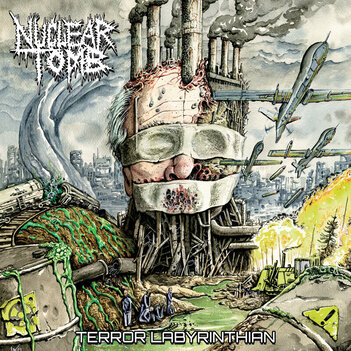
Written by: The Administrator
We slumbering scribes are nothing if not considerate. In that spirit, here's a relevant public service announcement: if you choose to fire up Terror Labyrinthian, the debut album from Baltimore's Nuclear Tomb, please know that you are willingly subjecting yourself to an undiluted sonic onslaught. Real face-melting stuff. Prodding and squirmy and barbed and apocalyptic and absolutely ripping. Representing a particularly weird and wild variant of death-oriented thrash, Nuclear Tomb have perfected a brand of chaos that appears, at first blush, quite unhinged. In reality, their approach is as calculated as it is contorted. In a case of promo material feeling exceptionally accurate, Nuclear Tomb do indeed skillfully integrate an old-school blistering aggression à la Sadus alongside a more punky off-kilter Voivodian approach to dynamics. That's a win/win combination in my book. On the very occasional Friday, a wagon arrives at the Sleeping Village’s crumbling gates, stuffed to the brim with sustenance. Today is the day we must offload all this new music, and so, in the process, we thought it would be worthwhile to share some choice cuts from this veritable mass of fresh meat. This is what we’ll be--and have been--listening to today here at the Village HQ. We hope you join us in doing so! On the docket for today, April 12th, 2024 Necrot, Corvus Corone, Heavy Temple, and Exist
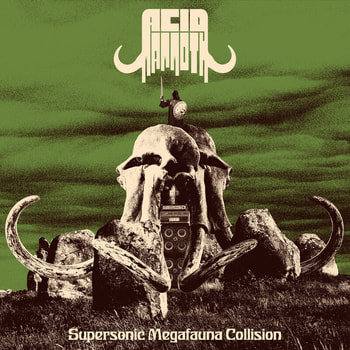
Written by: The Administrator
Prepare yourself, dear reader, for some stoner doom. Some lumbering stoner doom. Some lumbering mammothian stoner doom. Some lumbering mammothian psychedelic stoner doom. Some lumbering mammothian psychedelic groove-laden fuzzy megafaunic stoner doom. Some... Anyways, that's what we're dealing with here. Acid Mammoth are back for a fourth round in the ol' riff arena, Supersonic Megafauna Collision as their champion. If you're familiar with this crew's past work, you know the score. Acid Mammoth are, in my book, one of the premiere stoner doom bands active today. They are consistent, colorful, and make music that doesn't get bogged down in its own aura and atmosphere. The riffs are repetitive yet groovy and classically hooky, and the songwriting is intriguing enough to leave room for a little psych meandering without losing the thread too entirely. While I personally enjoy the vocal tone and find it to contrast nicely with the fuzzed out heft, I can see the vocals being a sticking point for some--they embrace a whining reediness. I've seen complaints that the album doesn't provide enough variation, and while the general scope of the album is pretty well established by the second track, we're not exactly here for innovation. If you're inclined to be bored by long-form psychedelic doom, this won't change your mind on the genre, particularly as the album approaches the tail end. But! Supersonic Megafauna Collision isn't about innovation--it is about the charming and quality reproduction of a formula that has been proven to work exceptionally well. I consider this the band's best work yet. If you're on the hunt for that good ol' lumbering mammothian psychedelic groove-laden fuzzy megafaunic stoner doom, Acid Mammoth will do nicely. Acid Mammoth - Supersonic Megafauna Collision was released April 5th, 2024 via Heavy Psych Sounds. Find it here! 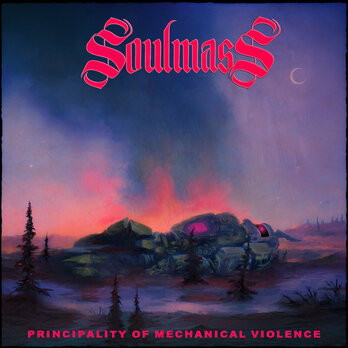
Written by: The Administrator
No time for a superfluous introduction. Here is a collection of things I love about Principality of Mechanical Violence, the latest album from death metal duo Soulmass. Let us begin. Firstly, I love the album artwork. I am inclined to judge a book by its cover, and the case of this gorgeous piece by Samuel Nelson, I was immediately struck by the evocative palette and setting. Here, Samuel has captured a moment in time so articulately as the moon rises over a prone gundam. This is the gloaming; the moment where dusk becomes night. I generally adore heavy usage of pinks and purples, and the color of the logo is warm and wonderful, full stop. The color scheme in general feels quite unique in the world of death metal, and stands out from the crowd. It is by far one of the best covers I've seen this year. |
WELCOME!We provide thoughtful reviews of music that wakes us from slumber. Written by a highfalutin peasantry. Archives
April 2024
Categories
All
|
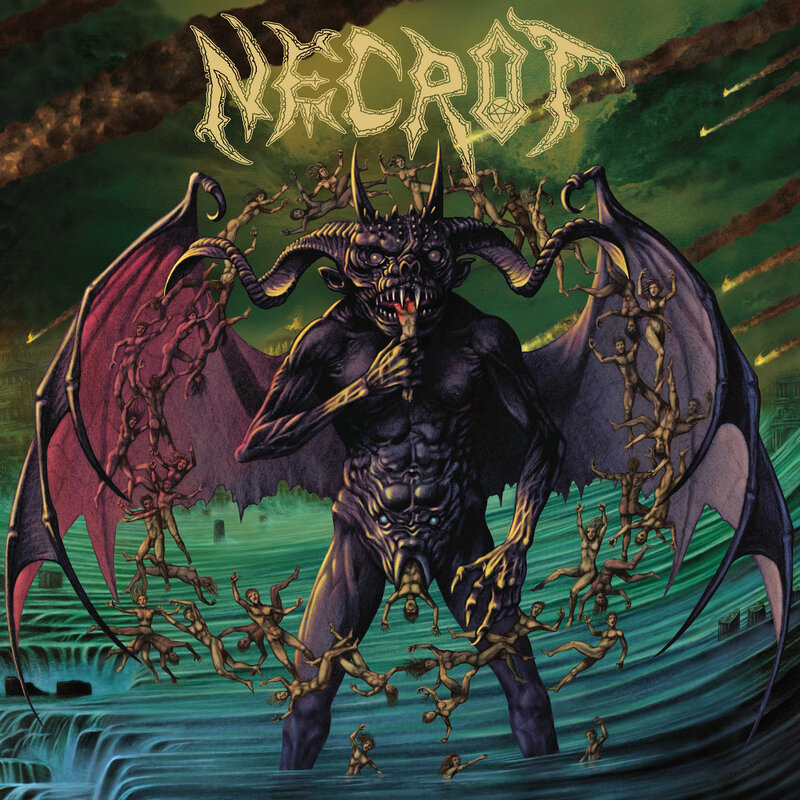
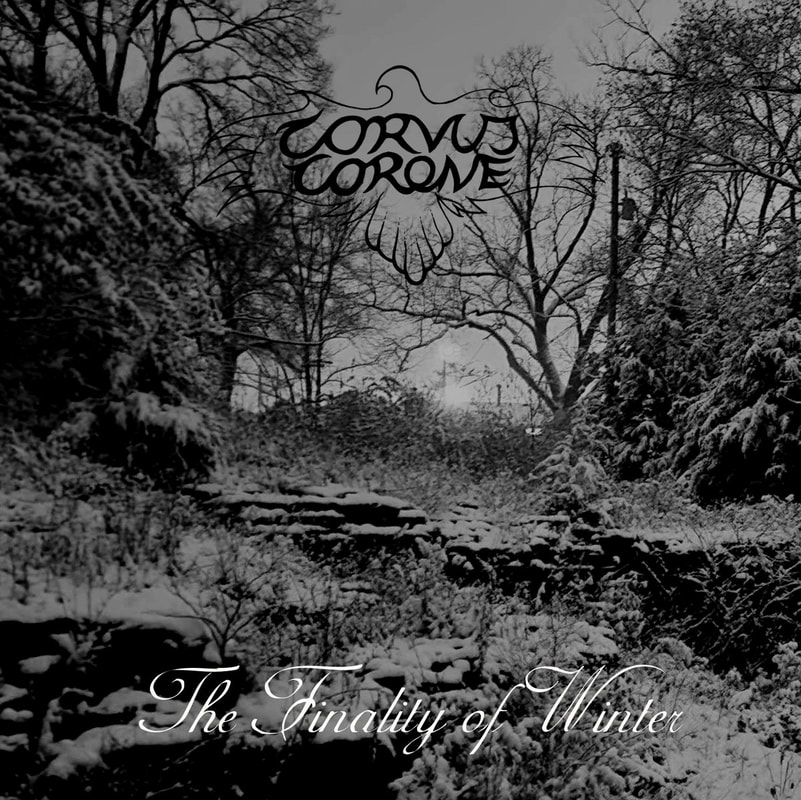
 RSS Feed
RSS Feed